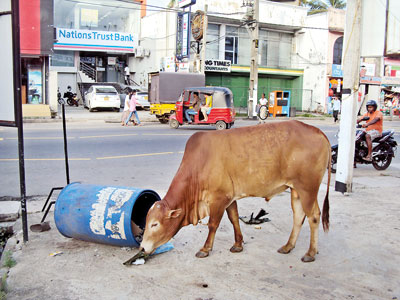News
Govt to rid Metropolis of stray cattle, dogs and of beggars

The Ministry of Local Govt & Provincial Councils has proposed to increase the fine of Rs 100 to Rs 25,000 and two years imprisonment for dog owners who let their dogs stray.
The Govt intends to rid the Metropolis of roaming cattle, stray dogs and beggars.
The Megapolis Ministry, starting mid-June, will launch a massive programme to round up all the cattle, dogs and beggars on the roads and transport them to shelters in distant areas.
This step is taken in view of several road accidents caused by an increasing number of cattle roaming the roads of cities and towns.
In addition, beggars begging inside buses and railway stations have become an eyesore, causing much inconvenience to commuters and the public.
Accordingly, the environment police will conduct regular raids on buses and along pavements, and arrest persons begging and making themselves a public nuisance.
Urban Development Authority (UDA) Director Keerthi Dissanayake said those arrested would be charged under the Vagrants’ Ordinance and thereafter, taken to the Social Service Dept detention home at Ridiyagama in Hambantota.
“The beggars will be provided with free board and lodging, and undergo rehabilitation to be productive in agriculture and self-employment projects,” he said.
The Megapolis Ministry said that, according to a recent survey, there are an estimated 700 beggars, of whom 500 have already been sent to the home.
Meanwhile, plans are afoot to round up stray cattle roaming the roads and transfer them to Embilipitiya in the Mahaweli area.
Rs 20 million has been reportedly spent on a 100-acre land that has been fenced with a gate. This project will be managed by Ven. Omalpe Sobitha Thera.
Mr Dissanayake said there are around 500 stray cattle in the Colombo District alone, with most of them in Piliyandala, Kesbewa and Kaduwela areas.

There are around 500 stray cattle in the Colombo District alone, with most of them in Piliyandala, Kesbewa and Kaduwela areas.
In the last four months, the UDA had caught 15 stray cattle, whose owners let them stray on the roads and into people’s gardens.
The stray cattle caught will be kept for a couple of days and, if there are no claimants, transported to the farm in Embilipitiya. “Owners will be fined Rs 1,000 for the animal’s return, and the transport cost from Embilipitiya, also to be borne by them.” The operation will begin in the Colombo District and extend to the whole Western Province.
To control the stray dog population, the Govt intends to introduce an amendment to the Dog Registration Ordinance of 1901.
The Ministry of Local Govt & Provincial Councils has proposed to increase the fine of Rs 100 to Rs 25,000 and two years imprisonment for dog owners who let their dogs stray. The amendment, approved by the Cabinet, is with the Legal Draftsman .
It is envisaged the amendment will make people more responsible in managing their pets.
Anti Rabies Clinic, Field Section & Dog Pound, Director, Dr I.V.P. Dharmawardena, however said that, they have not designed any special plan under the programme, with the anti-rabies vaccinations and neutering programmes taking place as usual. “We visit homes and vaccinate dogs, with around 8,000 dogs vaccinated this year,” he said.
Under the 2006 policy decision, captured stray dogs are not euthanised but, vaccinated/neutered and released.
The Health Ministry Anti Rabies Unit claimed that around 70% of stray dogs have been vaccinated under the rabies control programme started with the World Health Organization in 1975.
Under this programme, there has been a massive vaccination and sterilisation of dogs, while adoption of puppies by households has also been carried out.
A ministry official said the number of rabies cases reported has reduced drastically since 1973. He said that, this year only five cases have been reported compared with 20 cases reported for the corresponding period last year. Sri Lanka reported 377 dog-bite rabies cases in 1973.

